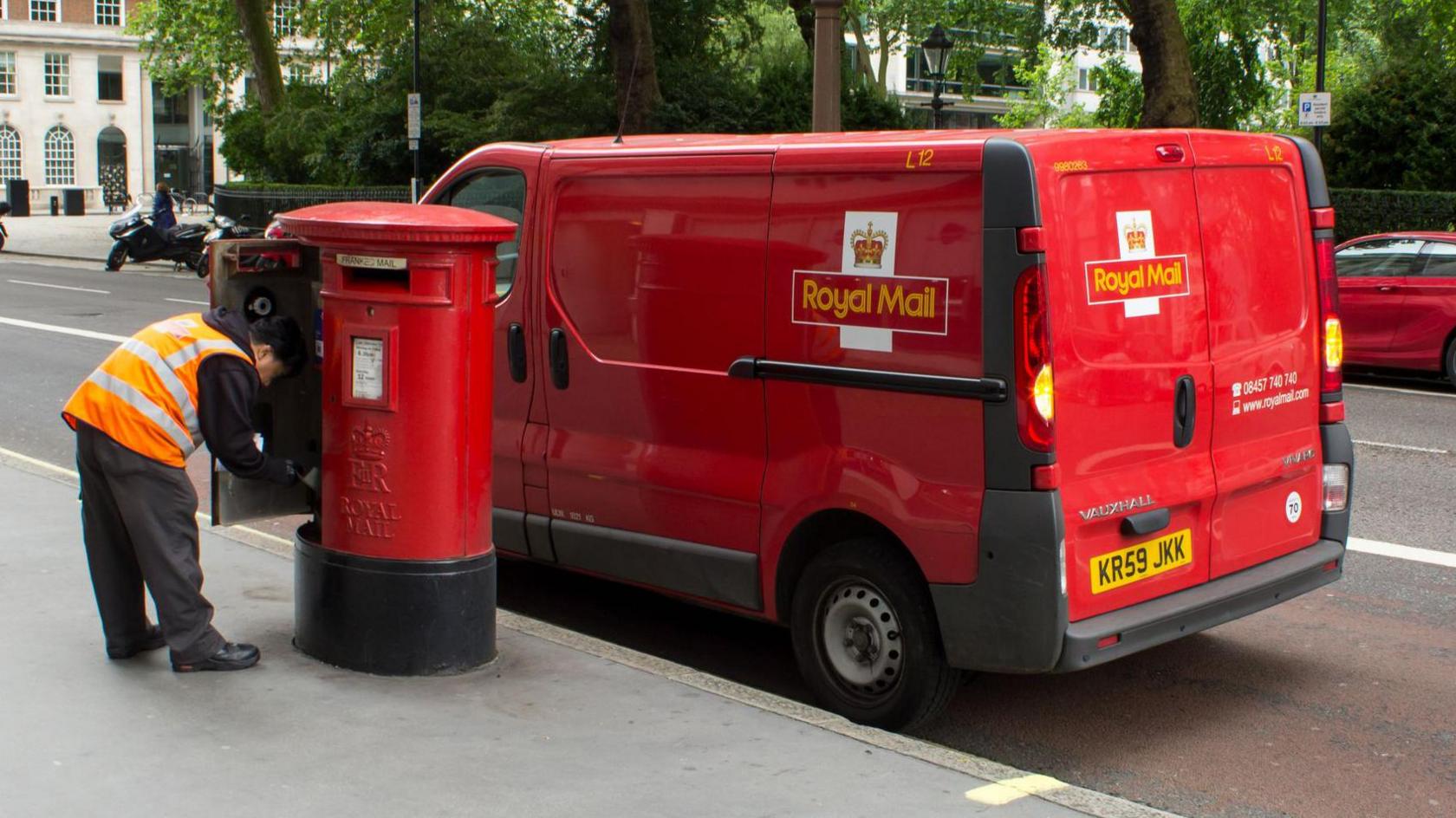Royal Mail to scrap second-class post on Saturdays

- Published
Royal Mail will start to deliver second-class letters on every other weekday and not on Saturdays to help cut costs, the industry regulator has said.
Ofcom said a reform to postal service was needed as people are sending fewer letters each year, so stamp prices keep rising as the cost of delivering letters goes up.
The changes mean second-class letters will be delivered either on Monday, Wednesday and Friday, or on Tuesday and Thursday, in a two-week cycle.
Royal Mail welcomed the changes, which will take effect on 28 July, but the move was criticised by some consumer and business groups.
Under the current one-price-goes-anywhere Universal Service Obligation (USO), Royal Mail has to deliver post six days a week, from Monday to Saturday, and parcels on five from Monday to Friday.
Ofcom says Royal Mail will have to continue to deliver first-class letters six days a week.
"These changes are in the best interests of consumers and businesses, as urgent reform of the postal service is necessary to give it the best chance of survival," said Natalie Black, Ofcom's group director for networks and communications.
However, just changing Royal Mail's obligations will not improve the service, she said.
"The company now has to play its part and implement this effectively."
Royal Mail estimates it will take 12 to 18 months to implement the changes across its network.
It has been piloting the changes to delivery since February in 37 of its 1,200 delivery offices, and said it was "keen to move ahead with deployment as soon as possible".
Ofcom estimates that Royal Mail could save between £250m and £425m a year by making the changes.
Royal Mail's parent company, International Distribution Services (IDS), said Ofcom's announcement was "good news for customers across the UK", and that it would support a "reliable, efficient and financially sustainable Universal Service".
Martin Seidenberg, IDS chief executive, said the changes reflect the "realities of how customers send and receive mail today".
Ofcom is also making changes to Royal Mail's delivery targets.
The company will have to deliver 90% of first-class mail next-day, down from the current target of 93%, while 95% of second-class mail must be delivered within three days, a cut from the current 98.5%.
However, there will be a new target of 99% of mail being delivered no more than two days late to incentivise Royal Mail to cut down on long delays.
Ofcom has fined Royal Mail three times since 2020 for missing delivery targets - £1.5m in 2020, £5.6m in 2023, and £10.5m in 2024.
Consumer group Citizens Advice said Royal Mail had a "woeful track record of failing to meet delivery targets, all the while ramping up postage costs".
Tom MacInnes, Citizens Advice director of policy, said Ofcom had "missed a major opportunity to bring about meaningful change".
"Pushing ahead with plans to slash services and relax delivery targets in the name of savings won't automatically make letter deliveries more reliable or improve standards," he said.
The UK Greeting Card Association also criticised the move, saying it was "concerned that a reduction in the second-class service, would lead to a reliance on uncapped, unregulated first-class mail that is increasingly unaffordable for businesses and consumers alike".
Royal Mail fined £10.5m for missing delivery targets
- Published13 December 2024
Royal Mail takeover by Czech billionaire approved
- Published16 December 2024
The Liberal Democrats said Ofcom's announcement was a "deeply worrying decision that could leave countless people who rely on these deliveries in the lurch".
"People need to know that their post will arrive on time so they can go about their lives, and this move flies right in the face of that," said the party's business spokesperson, Sarah Olney.
The Department of Business and Trade, which oversees Royal Mail, said: "The public expects a well-run postal service, with letters arriving on time across the country without it costing the earth."
People now use the postal service in a different way, so "it's right the regulator has looked at this," it said.
"We now need Royal Mail to work with unions and posties to deliver a service that people expect, and this includes maintaining the principle of one price to send a letter anywhere in the UK," a spokesperson added.
The number of letters Royal Mail delivers has fallen from a peak of 20 billion in 2004-05 to 6.6 billion in 2023-24.
Since 2008, Royal Mail's revenues from letters have fallen from £6.9bn to £3.7bn.
However, the price of stamps has continued to rise. Since 2022, Royal Mail has hiked the cost of a first-class stamp from 85p to £1.70.
Despite pushing up prices, in 2023-24, Royal Mail made a loss of £348m.
Alongside the delivery changes, Ofcom also said it had launched a review of pricing and affordability on Thursday, "which will consider concerns that many people and organisations have raised about stamp prices".
Susannah Streeter, head of money and markets at Hargreaves Lansdown, said the change to less frequent second-class deliveries "will be music to the ears of Royal Mail's new owner".
The £3.6bn sale of Royal Mail to Czech billionaire Daniel Kretinsky's EP Group was cleared by shareholders in April.